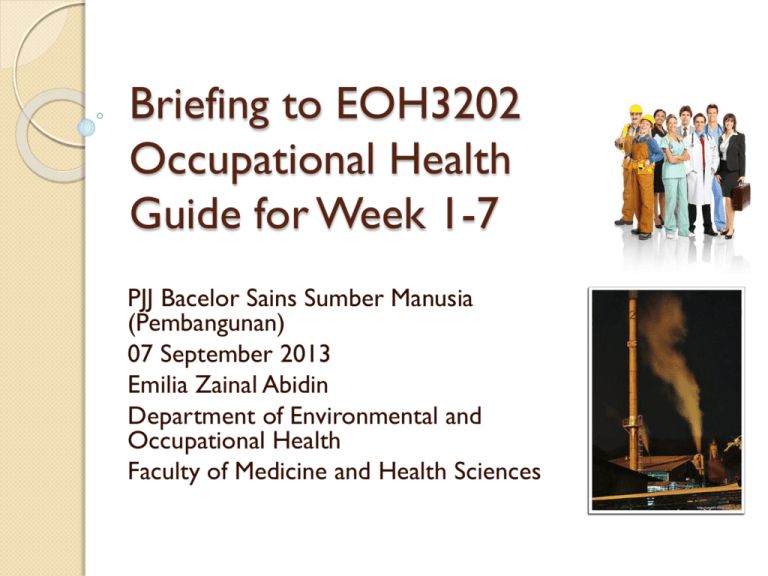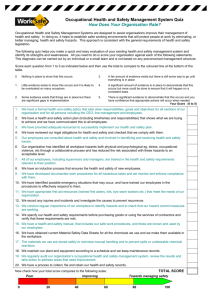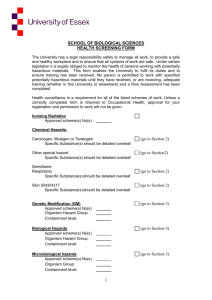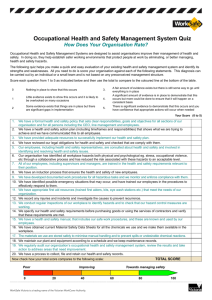Briefing to Course EOH3202 Occupational Health
advertisement

Briefing to EOH3202 Occupational Health Guide for Week 1-7 PJJ Bacelor Sains Sumber Manusia (Pembangunan) 07 September 2013 Emilia Zainal Abidin Department of Environmental and Occupational Health Faculty of Medicine and Health Sciences I am here to assist you Emilia Zainal Abidin ◦ BSc. Biochem, MSc. Com Health, PhD Environ Med Department of Environmental and Occupational Health, Faculty of Medicine and Health Sciences, Universiti Putra Malaysia Phone No.: 03-89472643 emiliazainal@gmail.com Course Synopsis This course include a discussion about the health, safety and welfare of employees and the organization and functions. Health problems caused by disease agents associated with the various types of work will be developed further. Course Synopsis (Cont.) This course also provides exposure to workers' compensation issues as well as stress and violence at work. In addition, occupational health principles, principles of prevention and control measures are also discussed in detail. Where are you right now? Course Objectives To correlate occupational health services and the role played by the government and other institutions in the field of occupational health in Malaysia (C5, TS) To identify the source of exposure to biological, chemicals and physical agents and its hazardous effects to workers health and to control and manage the hazards (A4, LL) To understand the details of the diseases that can be found in the workplace (P4, CS) Never mind the course objectives, but the most important point, how will I be assessed? Course Assessment Assessment for this course is divided into: (i) Overall Continuous Assessment Assignment 1 (group work) Assignment 2 (individual) 30 % 10 % 20 % (ii) Mid-term Examination 30 % (i) + (ii) (ii) Final Examination Overall Total 60% 40% 100% So far any questions? Assignments Topics for Group Assignment [10%] Divide yourselves into a group of 10. Select any ONE [1] of the following topic for research and write-up of report. Students are requested to search for information from reference books and from other sources available on relevant websites. 1. Identify all relevant hazards in a semi-conductor manufacturing sector/industry and methods (suggestions) to manage and control only THREE [3] major hazards which have been identified. Tip: The management and control of hazards should be described in terms of hierarchy of control (Unit 4 page 36 in module) Explain hazards in terms of these: Physical: elevated objects, noise, high voltage, mechanical injury Chemical: hydrocarbon under pressure, toxic materials, solvents Biological: virus, needle stick injury Ergonomic: poor body posture, carry heavy weights, repetitive work Psychosocial: stress or violence at the workplace Physical hazard Chemical hazard Biological hazard Ergonomic hazard Psychological hazard Use the hierarchy of hazard control for your report Individual assignments Topics for Individual Assignment 1 [2%] ◦ Video Viewing of “One Night in Bhopal” ◦ Please answer the given quiz and submit by the 4th week of this semester Topics for Individual Assignment 2 [9%] (SCL) ◦ Submit your answers by the end of week 6 Topics for Individual Assignment 3 [9%] (SCL) ◦ Submit your answers by the end of week 13 Main References Module EOH3202 Aw, T.C., Gardiner, K. & Harrington, J.M. (2007). Pocket Consultant: Occupational Health. Oxford: Blackwell Publishing. La Dou, J. (2007). Current Occupational and Environmental Medicine. New York: McGraw-Hill. Sadhra, S.S. & Rampal, K.G. (1999). Occupational Health: Risk Assessment and Management. Blackwell Science. Buku Akta Keselamatan dan Kesihatan Pekerjaan 1994. Buku Akta Kilang dan Jentera1967. Other References National Institute of Occupational Safety and Health. (2004). Overtime and Extended Work Shifts: Recent Findings on Illness, Injuries and Health Behaviours. Washington: DHHS (NIOSH). Lingard, H & Rowlinson, S. (2005). Occupational Health and Safety in Construction Project Management. Oxon: Spon Press. What will happen without good occupational health governance? Bhopal tragedy, India ◦ December 1984, a highly toxic gas was leaked from a pesticide plant in city ◦ Winds spread the poison through a densely populated area ◦ Many died instantly, others as they tried to flee, more than 20,000 people died in total in the aftermath of the leak 22 Bhopal and Union Carbide 23 Recent tragedies Chernobyl nuclear disaster, Kiev, Ukraine ◦ April 26, 1986, a reactor at the Chernobyl nuclear power plant experienced a catastrophic failure ◦ Resulted in the worst nuclear power disaster in history ◦ due to a flawed reactor design and poorly trained plant personnel ◦ Amount of radiation released was at least 100 X that of the Hiroshima and Nagasaki atomic bombs combined 24 Chernobyl 25 Bright Sparklers fireworks explosion at Sungai Buloh Tragedy happened in 7th May, 1991 Fireworks factory and fire killed 22 people and injured 103 others Bright Sparklers Sdn. Bhd violated many laws to carry out dangerous operation Commission found that legislations pertaining to siting, construction, maintenance and operations of the factory were not adhered to 26 What is Occupational Health? Definition 1: Occupational Health is the promotion and maintenance of the highest degree of physical, mental and social well-being of workers in all occupations by preventing departures from health, controlling risks and the adaptation of work to people, and people to their jobs ◦ (ILO-WHO 1950) Definition 2 - Occupational Health is the maintenance and promotion of workers’ health and working capacity, improvement of working environment and work to become conducive to safety and health and the Development of work organisation and working culture – safe, healthy and enhance productivity ◦ (ILO-WHO Committee on Occupational Health 1955) Buried by mill scale at pier What would you suggest as an Occupational Health professional (Figure 1). (Figure 1) (Figure 2) What improvements would you suggest as an Occupational Health professional? 28 OH accidents: Example Buried by Mill Scale At Pier Around 8.45 am on February 24, 2012 a fatal accident occurred at Port Klang, Selangor involving a Bangladeshi employee who worked with the cleaning contractor During the accident, the victim was collecting mill scale that has spilled on the pier floor under the path of the wharf crane (capacity 20 tons), which, at the time was unloading the mill scale from vessels into the hopper on the pier (Figure 1). While the grab bucket used to transport the mill scale passing through the area where the victim was working, grab bucket had opened suddenly and cause the load carried to fall and buried the victim below (Figure 2). Victim died on the way to the hospital. 29 OH accidents: Example pier Hazard Identification, Risk Assessment and Risk Control [HIRARC] should be done more thoroughly ◦ Cleaning work should not be performed while the grab bucket was operating ◦ Safe work procedures Supervision over a work Investigation should be carried out on every near missed incident and dangerous occurrences The causes of these incidents, particularly those involving mechanical failure of a machine must be identified Activities such as scheduled maintenance and inspection of machineries should be performed 30 Self-learning Mid semester’s test Based on Unit 1-11 Self-learning according to the given module Mid semester’s test Chapter 1 to 11 from module What would you prefer? Any requests? ◦ 2 hours examination? ◦ 50 objectives? ◦ 5 out of 8 short answer questions? What to focus on? Chapter 1: Introduction to Occupational Health ◦ Historical perspective of occupational health Chapter 2: Roles of occupational health professionals What are the competencies in occupational health What to focus on? Chapter 3: History of Occupational Health Services ◦ ◦ ◦ ◦ SOCSO DOSH NIOSH KKM What to focus on? Chapter 4: Introduction to Hazard ◦ What are the hazards in occupational health? ◦ How to identify risks? What are the steps? Chapter 5: Legal requirements of OSH ◦ How law in Malaysia evolved? ◦ OSH Act 1994 ◦ FMA Act 1967 What to focus on? Chapter 6: Noise ◦ How to control noise exposure? ◦ What are the laws regarding noise? Chapter 7: Physical hazard – suspended particulates ◦ Fractions of dusts ◦ What are Aerosols? What to focus on? Chapter 8: Physical hazard – radiation and heat ◦ Ionizing and non-ionizing radiations ◦ Examples of each Chapter 9: Ergonomic hazard ◦ Definition ◦ Examples of ergonomic health problems What to focus on? Chapter 10: Chemical Hazard: Organic solvent poisoning ◦ ◦ ◦ ◦ The health effects The methods to control What tests are used in the workplace Why solvents are hazardous Chapter 11: Chemical Hazard: Heavy metal ◦ What tasks will expose workers ◦ How to measure metals in worker’s biological samples? Success is in your hands! 39





